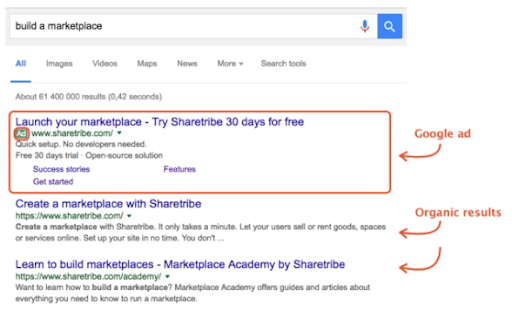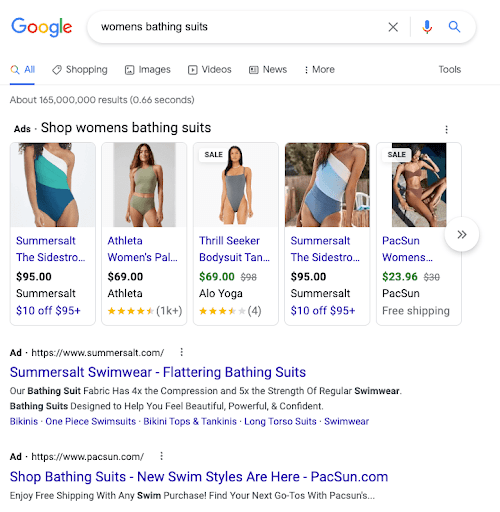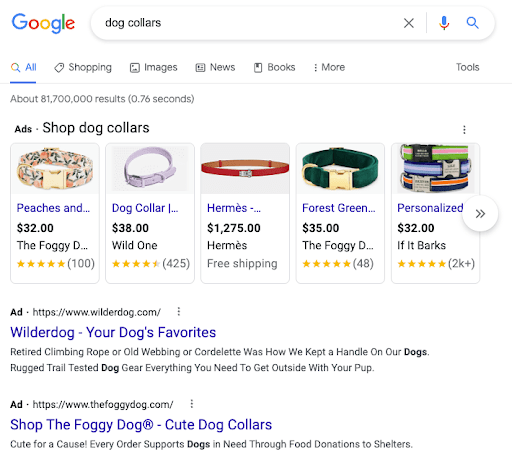ECommerce PPC Management: What Businesses Need to Know
PPC advertising is a great way for companies to grow their online presence and attract new customers. However, companies need to be diligent in how they manage their campaigns to optimize their ROI. Learn more about ECommerce PPC management here.
PPC, or pay-per-click advertising, is a digital marketing strategy in which advertisers pay a fee every time one of their ads are clicked.
Google Ads, for example, follows a pay-per-click advertising model. Websites bid on keywords related to their business, products, or services, and in return, they appear at the top of Google’s search results page. However, websites only pay when users click on their ad.

This is valuable for ecommerce businesses because it increases their visibility and makes consumers more likely to visit their website. Especially in a competitive industry, companies may have a hard time ranking organically.
Social media platforms, such as Facebook, YouTube, and Twitter also offer PPC advertising because it is an effective way for companies to target their audience.
By managing their ecommerce PPC campaign well, ecommerce companies can continue to optimize their ads and improve their performance metrics.
What is Ecommerce PPC Management?
PPC management entails monitoring and overseeing these campaigns. In order to get the highest return on their investment, companies that invest in PPC need to be cautious about their ad spend and target the right customers.
By diligently planning their PPC campaigns, companies can lower their costs, increase their click-through rates, and increase sales.
Need help with ecommerce PPC management? Check out Top Design Firm’s directory of top digital marketing companies to get started on your campaign.
Need help selecting a company?
Based on your budget, timeline, and specifications we can help you build a shortlist of companies that perfectly matches your project needs. Get started by submitting your project details.
Why is PPC Management Important for Ecommerce Businesses?
While many companies may be hesitant to spend a lot of money on PPC advertising, it is one of the most effective ways for companies to boost their online visibility. Here are a few benefits of PPC advertising for ecommerce businesses:
- Instant traffic
- Warm leads
- PPC supports other digital marketing strategies
- PPC isn’t affected by algorithm changes
PPC provides instant traffic
Unlike search engine optimization (SEO), companies that employ PPC campaigns can see immediate results.
Most Google Ads launch within one business day. Once it’s up and running, users are able to click on it right away, generating traffic and increasing sales. In comparison, most websites never rank organically, which severely limits the amount of traffic coming to a website.
Unless the website has already established a very strong domain authority, PPC is a much more effective way for companies to increase their visibility.
Whereas it could take months to see an impact from SEO work, companies can see an impact from PPC ads right away. According to HubSpot, the average click-through rate for PPC ads is around 2%.
While this may not seem like a high number it can still have a huge impact on a business’s bottom line — a keyword that generates 5,000 searches per month would, on average, attract 100 new users.
By investing in PPC campaigns, ecommerce companies increase traffic to their website right away.
PPC drives warm leads
PPC ads allow companies to target their specific audience, so companies know that their ads are reaching potential customers who are most likely to convert.
Google Ads, for example, allows businesses to target users based on their :
- Lifestyles
- buying habits
- long-term interests
- Demographics
- Life events
On top of that, they’re able to retarget customers that have interacted with their business in the past or if they’re searching for a product or service that their business provides.
Using this information, companies can target warm leads, or people who are interested in their product or services. In reaching them, they can increase their conversion rates.
PPC can support other digital marketing strategies
While PPC platforms provide user data to help companies target their ideal customers, this information also provides a lot of insight into their customers.
This data can then be used to support other digital marketing strategies such as SEO. For example, A/B testing may reveal that one type of copy or a specific landing page is more effective than another. Using this information, they can finetune their SEO campaign to reflect their PPC campaign.
In addition to collecting user data, traffic from PPC campaigns can improve a site’s SEO performance. By attracting new users, the website appears more authoritative, making it more likely for the website to rank highly on SERPs.
Additionally, paid ads can lead to more sharing, brand mentions, and backlinks, which can support other digital marketing efforts.
PPC Ads aren’t affected by algorithm changes
Unlike SEO campaigns, PPC ads aren’t affected by Google’s algorithm changes. If you pay, you get to play.
Google rolls out new algorithm changes all the time. While these changes help users find what they’re looking for, they also can hurt — or benefit — a webpage’s rankings. As a result, companies must continually adjust their content to rank on the first page of SERPs.
However, by investing in PPC ads, ecommerce companies will always be visible on the first page as long as they continue to pay.
How to Manage a PPC Campaign (For ECommerce Companies)
- Conduct keyword research
- Create a budget
- Develop landing pages
- Write ads
- Track results & adjust as necessary
- Remarketing
Conduct keyword research
The first step in creating a PPC campaign is determining what keywords you want to target. Keywords are the terms and phrases that users input to find the webpage they’re looking for.
For example, ecommerce websites like Summersalt would want to rank for keywords that describe their products, such as “womens bathing suits.”

Ecommerce companies can use SEO tools platforms like Ahrefs, SEMRush, or even Google Keywords Planner to conduct their keyword research.
Using these tools, digital marketers can determine what terms users are searching for, how competitive those keywords are, and how much it costs to advertise on those keywords.
For Google Ad campaigns, companies must also target keywords that are relevant to their business in order to earn a high-quality score.
High-intent keywords often generate more clicks and have higher conversion rates, but they’re more expensive to advertise on, so ecommerce businesses must choose their keywords carefully.
Additional reading, ‘How to Do Keyword Research for SEO: A Beginner’s Guide.’
Create a budget
One of the great things about PPC is that it’s easy for ecommerce companies to control their budget. Often, platforms like Google Ads allow companies to cap their spending. So, once a certain number of users click on a page, generating a certain amount of costs per click.
However, advertisers need to balance how much they’re spending on their ads to determine this limit.
Once they’ce determine the best keywords for their marketing budget, they need to do the math to determine what they will spend to advertise for that keyword.
Using keyword planning tools, companies should be able to identify roughly how many impressions they will have as well as an average click through rate. By multiplying impressions by the click-through-rate, they will be able to estimate the number of clicks they will receive.
Then they can multiple the volume of clicks by the cost per click to determine the ad spend. Here’s a formula to help you calculate what your ad spend will be for a specific keyword:
potential volume of clicks x average cost per click = potential ad spend
Can your company afford to spend that much on its PPC ads?
It may not be clear right away — once they’ve launched the campaign, ecommerce businesses should keep track on their return on ad spend (ROAS) to make sure their ads are worth the investment.
Additional reading, ‘PPC Guide: How the Ad Auction Works.’
Develop landing pages
Landing pages can have a huge impact on whether or not a user will convert into a paying customer.
In fact, how a website looks is a huge factor in how users perceive a brand — an opinion they form in less than a second.
To get the most out of a PPC campaign, ecommerce companies need to invest in web design and create top-notch landing pages. Here are a few tips to optimize your landing pages and increase conversions:
- Put important information at the top of the page
- Use images
- Show off your brand
- Use visuals to direct users through the page
- Develop different pages for different stages of the sales funnel
- Answer common questions
- Streamline your shopping cart to increase sales
It may take a few iterations to determine the best way to appeal to your audience, so companies that have the resources should build multiple landing pages. Then they can run AB tests to determine which one is most likely to convert users.
Additional reading, ‘3 Ways to Make Landing Pages that Convert.’
Create Ads & Write Ad Copy
The ads themselves are the first thing that users see, so they should encourage users to click.
No matter what type of PPC ad it is, it will include a headline and a call to action. The headline should include the keyword that is being targeted, as well as information about the brand or product.
Keep in mind though that there is a character limit for search ads. For example, Google Ads limits each headline to 30 characters and each ad description to 90 characters, as well as 15 for an Ad path.
In just a few sentences, companies have to pitch their products or services to compel users to click.

For example, the pet brand Wilderdog advertises using Google Ads. Their headline appeals to dog owners claiming that it will be their dog’s favorite product.
Then they use the description to explain how their product is different from others — their products are made from sturdy climbing rope and trail gear, making them extremely durable.
Display and video ads are a little more complicated than simple search ads, however, because they require visual content as well.
TheFoggyDog is another brand that advertises using the keyword “dog collars.” However, in addition to their search ad, they also invested in display ads.
This ad is featured at the top of the SERP featuring some of their most popular products — the peaches and the forrest green collars. Hoping to catch a user’s attention, these visuals help users know what to expect when they click on the page.
Track results & adjust as necessary
As companies roll out PPC ads, they should be tracking the success of their efforts. By checking their impressions, click-through-rate, and bounce rate, ecommerce companies can identify what is appealing to customers and what isn’t.
Companies can also use this data to perform AB testing on copy or images in their ads. This can help them recognize patterns that can increase their conversion rate and boost sales.
Remarketing
Remarketing, also known as retargeting, is when PPC agencies advertise to existing customers or people who have already visited their website.
The success rate of converting existing buyers is about 50% higher than attracting new customers, making it an effective way for ecommerce businesses to improve the success rate of their PPC campaigns.
Additional reading, 'CRM Retargeting: Remarketing to Existing Customers.'
Should You Hire An ECommerce PPC Management Firm?
While PPC can be handled by an in-house team, digital marketing companies and PPC specialists are experts in their fields. They’re familiar with various PPC strategies and are able to test several different options for their clients. By hiring a firm that specializes in this type of digital marketing, companies may see a higher return on their ad spend.
Additionally, managing a PPC campaign for an ecommerce company can take a lot of time and resources. By hiring a firm that already has these resources in place, ecommerce companies are able to focus more on growing their business.
Ecommerce PPC Management Services:
- Keyword analysis
- Bid management
- Geo-targeting
- Performance analysis
- A/B testing
- Channel targeting
If your small business doesn’t have a PPC expert that can manage each of these components of your project, you may want to consider outsourcing the project.
What Does an Ecommerce PPC Management Company Cost?
In addition to what you’re spending on ads, an ecommerce PPC agency costs between $250–$5,000 per month, depending on the scope of work.
To find an ecommerce PPC agency within your budget, use company reviews sites like Top Design Firms or Clutch where you can filter based on pricing.
Ecommerce PPC Agency Resources By Region:
Northeast
West
Midwest & Rockies
South
ECommerce PPC Management is Essential for Generating a Postitive ROAS
PPC advertising can help ecommerce companies boost their online visibility and increase traffic to their site. For ecommerce companies in particular, advertising online is important to attract new leads.
While some companies are hesitant to spend the money on this type of advertising, a well-managed campaign can jumpstart growth.
An ecommerce PPC management agency can help companies limit their PPC budget while attracting more customers, in the end, increasing their return on ad spend.
Need help with ecommerce PPC management? Check out Top Design Firm’s directory of top ppc companies to get started on your campaign.
Additional Reading
Need help selecting a company?
Based on your budget, timeline, and specifications we can help you build a shortlist of companies that perfectly matches your project needs. Get started by submitting your project details.